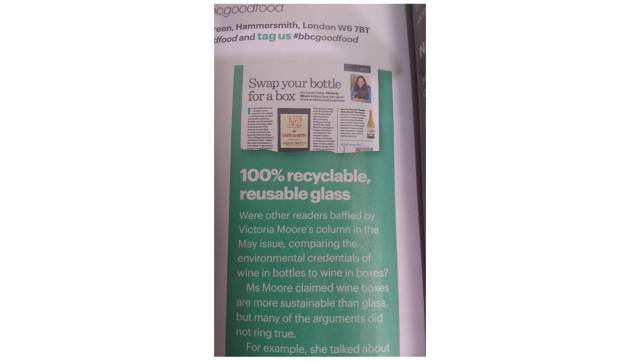A recent article in the BBC Good Food eco-edition has caused concerns over misleading information on recycling
British Glass technical director Dr Nick Kirk has responded to a recent article published by BBC Good Food magazine promoting wine sold using bag-in-a-box which, according to British Glass undermined important messages about recycling.
British Glass technical director Dr Nick Kirk addressed inaccuracies in a misleading and potentially damaging article that promoted wine sold using bag-in-a-box recently published in this month’s BBC Good Food magazine.
Dr. Kirk explained, “The article appeared in the BBC Good Food eco-edition, and our worry was that the piece undermined important messages about recycling – one of the most realistic and effective ways available to UK wine drinkers looking to minimise environmental impact. A quick check of the facts by our experts revealed the article was heavily based on one wine box company’s marketing, using statistics from dubious sources.”
A key part of the article’s rationale was that wine bottles are ‘single use’ and take ‘a millions years to decompose’ in landfill.
As Kirk stressed in his response – there is simply no reason for a bottle or jar to go to landfill.
Glass bottles are 100% recyclable – they can and should be re-melted back into new packaging indefinitely. And glass recycling facilities are available right across the UK. In contrast, the plastic bags inside wine boxes are not currently recyclable in the UK.
Kirk also explained that talking about how wine bottles decompose if they do end up in landfill is misleading.
“Plastics can become chemically active as they decompose, potentially causing problems. Glass, however, is made from non-toxic sand, lime and soda ash. If it does go to landfill it breaks down mechanically and turns back into sand – and is harmless to the environment,” said Kirk.
In fact in the US and New Zealand powdered recycled glass has been used to combat beach erosion.
The BBC Good Food article also opened with a statistic about the energy it takes to melt glass – which turned out to be approximately ten times the actual amount (when compared to calculations made using current official data).
“What the article completely glossed over was that using waste glass reduces the energy required to melt glass for wine bottles by around 25%. The more recycled material that goes in, the less energy is needed. But at the moment demand for waste glass to recycle outstrips supply – the industry needs us all to recycle our glass packaging – it really does matter,” Kirk stressed.
Dr Kirk’s reply to the magazine also made it clear that the benefits of recycling glass go beyond the manufacturing process. Packaging made from recycled material reduces that need for virgin raw materials, and so in turn the impact on the environment from the extraction and transport of these. Something not every packaging material can boast.
Kirk said, “British Glass believes consumer choice is important and clearly different packaging solutions have their merits and place, but in this instance a fair comparison has not been made. UK-made glass bottles contain on average 30% recycled material and often 65% or more for green wine bottles. So wine-lovers can be reassured that when they buy wine in glass and recycle, they’re making an excellent, sustainable choice.”




